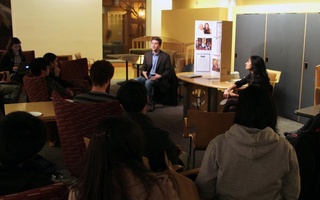As an undergraduate at Harvard, former Iowa Senator John C. Culver ’54, also a 1962 graduate of the Law School, took the football team by storm. Barrelling through obstacles and games, he eventually earned himself a spot in the Harvard Football Hall of Fame.
But perhaps the most important result of his time on the football team was the development of a deep friendship between Culver—who decided to apply to Harvard after witnessing a Harvard-Yale game—and teammate Edward M. “Ted” Kennedy ’54-’56, a relationship that would forever connect him with Harvard and its Institute of Politics.
In May 2010, Culver was appointed interim director of the IOP, which Kennedy had established as a living memorial to his brother, President John F. Kennedy ’40. Culver joined its senior advisory committee in 1975.
Until his death in August 2009, Kennedy never missed a meeting of the senior advisory committee. But because of his failing health, he was unable to physically attend his last meeting, so the advisory board, still helmed by Kennedy’s old football buddy, called him in.
“He said he wanted to be recorded present at the meeting because he never missed one,” Culver said.
A PATH TO SERVICE
When he arrived in Cambridge in the fall of 1950, Culver became the third generation of his family to attend Harvard. He began playing freshman football, but, missing his hometown of Cedar Rapids, Iowa, he felt unhappy and almost gave up on the sport in favor of basketball.
“I was kind of homesick,” Culver said, “But by the time I went back there for my sophomore year, I really enjoyed it and was happy at Harvard.”
Culver, who lived in then athlete-oriented Winthrop House, became a star on the football team as a fullback, eventually being inducted to the Harvard Varsity Club Hall of Fame in 1978 along with his team captain and friend, Richard J. Clasby ’54.
When he was not on the field, Culver fed his growing political interest as a government concentrator, eventually joining the United States Marine Corps for 39 months after graduating.
After, he attended Harvard Law School, graduating in 1962.
“When I was an undergraduate, I thought about either going into the foreign service state department or elected politics,” he said. “When I was back at law school, gradually my interest turned more to the political side and the opportunity of running for [public office] eventually won out.”
When Kennedy was elected to the Senate in 1962, he appointed Culver as his legislative assistant. However, it was not long before Culver launched his own political career. After a year in Kennedy’s office, he moved back to Iowa and was elected as a Democrat to the House of Representatives in 1964, only two years after his law school graduation. Culver served in the House from 1965 to 1975 before being elected to the Senate for one term in 1974.
Culver said that he felt fortunate that he was elected in 1964 to the 89th Congress because it had a Democratic supermajority, which allowed Congress to pass landmark legislation including Medicare and Medicaid.
“I think, historically, it’s the most productive two-year period in modern history,” Culver said. “It’s quite a contrast with today where you have a logjam between the two parties.”
Read more in News
Health Center Opens Doors on Holyoke StreetRecommended Articles
-
 FOOTBALL '09: Kennedy: Fighter From the Start
FOOTBALL '09: Kennedy: Fighter From the Start -
IOP Names Culver Interim DirectorFormer Iowa Senator John C. Culver ’54 will serve as the interim director of the Institute of Politics, Harvard Kennedy School Dean David T. Ellwood ’75 announced in a statement yesterday.
-
IOP Greets New MembersThe Institute of Politics welcomed students to its spring open house Friday afternoon and showcased the arrival of its spring fellows and the new director of the IOP, C. M. Trey Grayson ’94, Kentucky’s outgoing Secretary of State.
-
Richardson Named IOP Spring Visiting FellowFormer Governor of New Mexico Bill Richardson will be a Spring Visiting Fellow at the Institute of Politics during the week of March 28, the IOP announced yesterday.
-
IOP Alumnus Goes Back to RootsAs the new director of the Harvard Institute of Politics, C. M. Trey Grayson '94 lives in Kirkland House just like he did as a Harvard undergraduate 20 years ago.
-
 IOP Expands Director's Internship Program
IOP Expands Director's Internship Program













